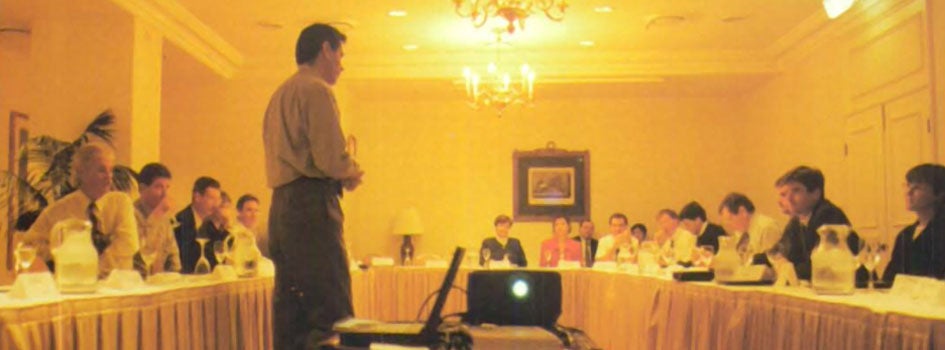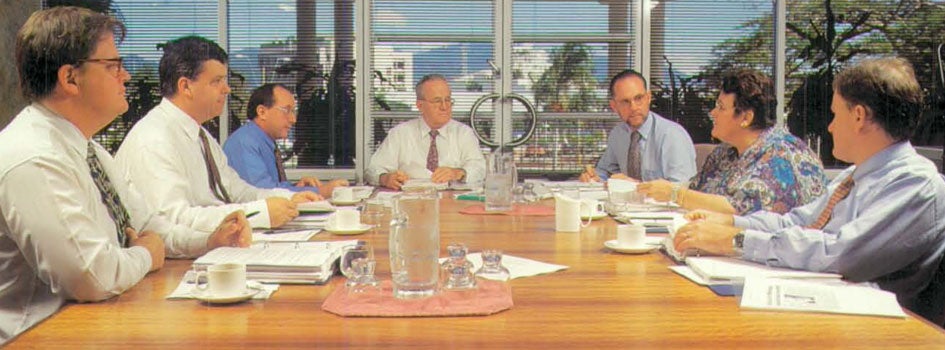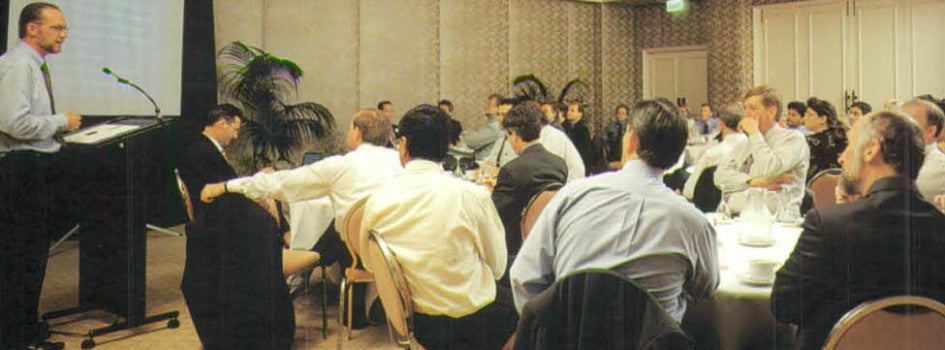History - 1997-2001
Growing our knowledge and expertise

At the end of the 1990s, QTC recognised it could offer its clients more than simple debt issuance. QTC implemented a client focused approach, called the ‘customer loyalty operating model’ that set out to understand its clients’ businesses, challenges and future directions.
In turn, QTC partnered with its clients to extend its expertise through training and education programs, sharing its knowledge and developing a greater understanding of the concepts, financial instruments and practices involved in managing debt and interest rate risk.
Back to topEducating ourselves and our clients

Since its inception in 1988, QTC’s role had matured, with its strategic direction shifting from a sole focus on its funding task to focusing also on the needs of its clients and the Queensland Government as a whole.
Recognising its ongoing success and viability relied on its ability to add real value to clients’ businesses, QTC set about developing a comprehensive understanding of clients, their businesses, challenges and future directions. In turn, QTC recognised its own financial knowledge could be extended to its client partners, to create additional value for their organisations and develop stronger and more collaborative partnerships.
In 1998, QTC developed and ran its first-ever Central Treasury Management (CTM) course and simulation game. An interactive course, the CTM focused on the role of a corporate treasury, to assist clients’ understanding of the concepts, financial instruments and practices involved in managing debt portfolios and interest rate risk and gain a more in-depth understanding of one of QTC’s core responsibilities. Apart from improving participants’ financial management knowledge, the course enabled a greater understanding of the processes behind QTC’s management of its day-to-day business of providing appropriate liquidity at the lowest possible cost of funds. This course was adopted as part of the post-graduate degree programs for major Queensland universities, including the University of Queensland and the Queensland University of Technology, and was run as part of the Finance and Treasury Association (Australia and New Zealand) annual conference.
Extending this, QTC drew upon its employees’ range of expertise and knowledge to tailor courses for its clients in relevant and specific areas of financial management. For example, in 1999, QTC delivered a financial management seminar to local governments in 11 regional locations. In the same year, QTC designed a specialist Cost of Capital Workshop, in partnership with senior lecturers from the Queensland University of Technology.
Today, QTC views providing education and training programs as complementary to delivering value-adding solutions to its client base. We offer a range of industry and client-specific training courses, including programs that cover cost of capital, project evaluation, investment and liquidity management and treasury management, to staff and clients alike. In addition to providing a worthwhile learning experience, QTC’s training programs provide us with valuable insight into our clients and their businesses, strengthening our relationships with them and creating valuable partnerships.
Back to topExpanding our advisory services

In the 1997-98 financial year, QTC strengthened and expanded its advisory services to provide clients with a broad range of professional corporate treasury advice. Services were provided in areas including treasury and financial risk advice; cash management strategies and services; joint venture and other forms of private sector participation; lease-versus-buy analysis; debt servicing; liability management strategies; infrastructure procurement strategies; securitisation and sale and lease-back proposals.
QTC’s specialist Advisory Services Division was established to focus on the delivery of financial advisory solutions, to help QTC’s clients achieve value for money. The Division saw rapid growth in the demand for its services across a range of industries and sectors, including water, rail, electricity, health, transport and local government.
In response to its clients’ needs, QTC also created a new division in February 2000, to satisfy the growing specialty services supplied to Queensland Treasury. This Division managed a range of Treasury-related issues, including whole-of-Government cash management; the provision of advice on matters of commercial and financial risk and policy issues; and the establishment of a whole-of-Government credit review function. Commencing in August 2000, the credit review function provided a review of State entities’ ability to service existing and planned levels of debt, ultimately assisting Queensland Treasury in assessing applications for funding under the State Borrowing Program.
In 2001, QTC undertook a further review of its structure, products and services to find the most efficient way to leverage its specialist resources and deliver better value to its clients. Moving from a functional structure to one based on multi-skilled teams, QTC was able to better offer access to a broader range of skills and services, facilitating client access to its specialist resources to develop customised solutions.
QTC’s focus on building relationships with its clients continues today as the fundamental platform on which the QTC business is built. Our service delivery, products, information technology systems, communication, project management and performance measurement systems are all tailored to ensure we improve how we deliver value to our clients, to achieve sustained financial success now and into the future.
Back to topCapturing QTC's knowledge

As a consequence of the opportunities created by globalisation and e-business, knowledge management became a key internal focus for QTC as it continued its program to develop information technology systems and best-practice methodologies.
Launched in 1999, QTC’s tailored electronic information management model stored all of QTC’s internal, incoming and outgoing information, enriching it through an online categorisation and retrieval process. This allowed all staff to have real-time access to information necessary to carry out their services and provided an important strategic tool to build loyalty with QTC’s clients by capturing information relevant to them in a central store.
Beyond this, the information system also allowed each employee to share their knowledge and experiences with the rest of QTC’s current and future employees, encouraging teamwork and information flows to build capacity across the organisation.
Knowledge management remains a fundamental advantage to QTC’s ability to work closely with its clients and deliver optimal outcomes for them and the State of Queensland as a whole. By equipping its employees with the information and resources necessary to deliver effective value to their clients, QTC works to deliver best practice solutions across a range of complex financial and risk management services.
Back to topEnterprise-wide Risk Management

In 2001, it was recognised that although QTC was managing certain risks very well, not all risks were being identified and managed, and some risks were being managed on a silo basis (ie, within teams) and not consistently across the organisation.
To address these issues, QTC embarked on a project to establish an Enterprise-wide Risk Management (EwRM) program. In 2002, the EwRM was implemented and continues to this day with a key objective of managing the risks of the organisation on a consistent and comprehensive basis.
Back to topWhole-of-Government lease facility

QTC’s efforts to expand its economies of scope led to the implementation of the whole-of-Government leasing facility in the 1998-99 financial year. This facility was established to reduce the cost of operating leasing in Queensland’s public sector, and gave public sector entities greater flexibility in structuring their leasing and financing requirements. In its first seven months alone, this initiative reduced the cost of operating leasing in Queensland’s public sector and provided standard documentation with equitable terms.
In the 2001-02 financial year, QTC’s whole-of-Government leasing facility was redesigned and relaunched to offer improved leasing outcomes for departments and agencies, with the aim of making the overall cost of leasing more favourable. This was achieved through the access to our low-cost funding and maintaining constant contact regarding a client’s intentions at the end of the lease. In this way, QTC continued to provide the best value-for-money service, delivering savings for the benefit of its clients and the State.
Back to topTools to assist our clients

In the 2000-01 financial year, QTC developed a number of new tools and systems to help it share its corporate knowledge with its clients. These tools were developed with the aim of giving our clients more information to make optimal financial decisions.
QTC’s quantitative analysts developed the Debt Forecasting Model, a financial management tool designed specifically for Queensland’s local governments. This model assisted local councils in their debt forecasting and financial reporting, and provided tailored information for financial decision making.
QTC remains committed to working with its client partners to ascertain their needs and provide relevant tools and information to enable them to achieve their business goals. By streamlining and improving access to resources and sharing our knowledge, QTC creates client value that culminates in whole-of-State benefits.
Back to top